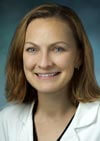Medical Student Training in Aging Research (MSTAR) Program
The Johns Hopkins Division of Geriatric Medicine and Gerontology’s summer training program immerses medical students at the end of their first year in a focused experience in aging research, supplemented by research training and clinical experiences.
As a student in this eight-week summer program, based in Baltimore, Maryland, you will participate in research, clinical, and academic experiences at one of the best teaching hospitals in the country. You can choose a research interest from basic sciences, clinical research, population-based research, education, or health services research. You will be paired with a research mentor to complete a specific project.
The summer experience includes a geriatric medicine and gerontology lecture series, epidemiology and biostatistics seminars, other research training, an ethnogeriatrics discussion series, and a variety of exciting clinical shadowing opportunities.
Students typically present their summer research at the annual meeting of the American Geriatrics Society and many students work with their mentors to publish their research findings.
Eligibility
To apply, you must expect to successfully complete your first year of medical school at an accredited medical school. The program welcomes and encourages students of all genders and from minoritized groups to apply.
Program Directors
Colleen Christmas, M.D.
Associate Professor of Medicine

Sevil Yasar, M.D., Ph.D.

Neal S. Fedarko, Ph.D.

Stephanie Nothelle, M.D.
School of Medicine

Application
The program accepts 18 students each year. Program costs are funded through scholarships.
Applicants must be citizens or non-citizen nationals of the United States, or must have been lawfully admitted for permanent residence (i.e., in possession of a currently valid Alien Registration Receipt Card I-551, or some other legal verification of such status.)
Individuals on temporary or student visas and individuals holding PhD, MD, DVM, or equivalent doctoral degrees in the health sciences are not eligible.
The program is part of the national Medical Student Training in Aging Research (MSTAR) Program to encourage medical students, particularly those with an interest in research, to consider a career in academic geriatrics.
What to Know Before You Arrive
-
Students are provided a stipend that varies according to the length of the program. A minimum of 60 days of time is required and 60 days of funding is available. You must participate in the program full-time for its duration.
Travel and living expenses are not covered by the stipend.
If you are receiving a stipend or salary support from a federal source, then you are not eligible for this program. You may not hold another award or participate in another program concurrently with the MSTAR program.
-
Students can contact the Medical Institutions Housing Office for assistance in housing during the program.
-
Please bring:
- Stethoscope
- Short white coat
- Professional clothing for clinical rotations and other times as needed:
- Men: Ties, collared shirts, and dress slacks
- Women: Dresses, skirts, blouses, and tailored pants
Curriculum
-
Through a limited number of clinical rotations, students observe the clinical services offered through the Division of Geriatric Medicine and Gerontology, which may include:
- Primary and specialty care for older patients at The Beacham Center, the Division’s primary care center. Specialty services include osteoporosis, continence, and Alzheimer’s and memory problems.
- JHOME, which provides regular physician house calls as well as nursing services and rehabilitative therapy for local home-bound patients.
- Hopkins ElderPlus PACE, which provides a full array of services including comprehensive care, day care, and in-home services.
- Long-term care through the Specialty Hospital Programs, which provides all levels of care, including Inpatient rehab beds and chronic hospital beds.
-
Researchers, clinicians, and program leaders from all parts of the Division of Geriatric Medicine and Gerontology, as well as other divisions of Johns Hopkins, lead workshops for program participants. Topics range across the medical and research spectrum, from cultural diversity to biostatistics and epidemiology.
-
A number of venues offer students the chance to learn about research, geriatric medicine, and gerontology, from a health services orientation and lecture series to meetings with mentors and lunches with service providers and researchers.
Research Opportunities
During the Medical Student Training in Aging Research (MSTAR) Program, students will be able to participate in research projects looking at a range of topics within basic science, clinical and population-based research, and health services research.
Explore recent examples of MSTAR research projects
-
In basic science, students can choose from three research areas:
The causes and treatment of frailty: Researchers at the Claude D. Pepper Older Americans' Independence Center (OAIC), in Baltimore, Maryland, work on projects that will develop novel interventions to diagnose, prevent or treat frailty, or minimize adverse outcomes related to the presence of frailty.
Examining the common link among frailty, inflammation, and cancer: At the Division of Geriatric Medicine and Gerontology’s Aging Research program, in Baltimore, Maryland, researchers are assessing frailty via genetics and mouse models as well as looking for the common link among frailty, inflammation, and cancer.
Neuropathology: In the Division of Neuropathology, researchers have undertaken a number of projects that relate to gerontology, including Alzheimer’s Disease, neurological diseases, and neurodegeneration.
-
Working through one of two Centers on Aging and Health on the Johns Hopkins campus in Baltimore, Maryland, medical students have the opportunity to do research in a number of content areas related to clinical and population-based aging research. Those content areas include:
- The natural history, risk factors, and prevention of chronic diseases, frailty, disability, falls, comorbidity, cognition, and dementia
- Social and behavioral epidemiology
- Health promotion and prevention for older adults
- Causes for health disparities in older populations
- Randomized trials of behavioral and pharmacologic therapies to prevent physical and cognitive disabilities, and social modes for prevention.
-
At the Centers on Aging and Health, a research team studies health services. Current research projects fall in these categories:
- Guided care
- Successful aging and association with the use of health care
- Inclusive care of the elderly
- Care for chronic disease
-
A major strength at Johns Hopkins, both within the geriatrics division and beyond, is it's highly refined programs to develop and evaluate educational interventions. These interventions may target medical student knowledge and attitudes about aging populations, caregiver needs, patient needs, non-geriatrics healthcare providers, and many others. To find out more about this research area of the program, please contact Colleen Christmas at cchristm@jhmi.edu
Student Resources
-
-
-
- The American Geriatrics Society: Information for Trainees
- The Gerontological Society of America Student Section
- Medical Student Training in Aging Research (MSTAR) Program
-
Experience Baltimore

Called “Charm City” for a reason, Baltimore is a place that has a little something for everybody. Baltimore is a spirited city – a unique blend of historic charm, cultural heritage and urban vitality. With hanging out at the Inner Harbor, attending neighborhood festivals, biking to school and more, Johns Hopkins medical students, graduate students and residents have a lot to love about Baltimore.
